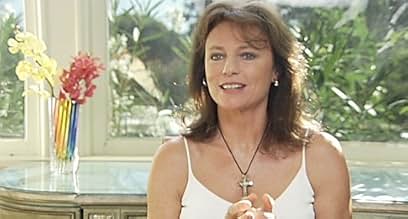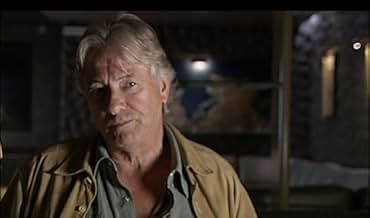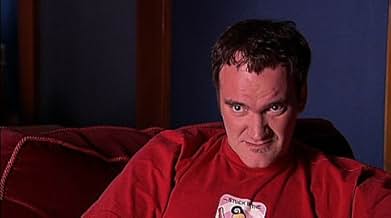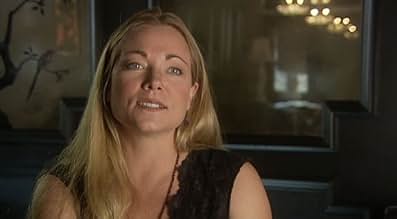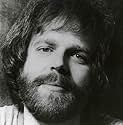Z Channel, une magnifique obsession
Original title: Z Channel: A Magnificent Obsession
IMDb RATING
7.6/10
1.9K
YOUR RATING
The story of Z Channel, one of the first U.S. pay cable stations and its programming chief, Jerry Harvey. Debuting in 1974 in LA, their eclectic slate of movies became a prime example of the... Read allThe story of Z Channel, one of the first U.S. pay cable stations and its programming chief, Jerry Harvey. Debuting in 1974 in LA, their eclectic slate of movies became a prime example of the untapped power of cable television.The story of Z Channel, one of the first U.S. pay cable stations and its programming chief, Jerry Harvey. Debuting in 1974 in LA, their eclectic slate of movies became a prime example of the untapped power of cable television.
- Awards
- 1 win & 1 nomination total
Jerry Harvey
- Self - Program Director, Z Channel
- (archive footage)
Featured reviews
I saw this film at the 2004 Toronto International Film Festival. The daughter of the late filmmaker John Cassavetes and actress Gena Rowlands, Xan (Alexandra) Cassavetes grew up surrounded by the culture of film. But in her teens, she began to form her own taste, thanks in part to an innovative Los Angeles area cable channel. Z Channel began in 1974, long before there was a Blockbuster Video on every block, and it showed both neglected American films as well as the greats of European cinema. Xan set out to make a straight documentary about the channel, and in the process found a whole other story.
Jerry Harvey was a film geek's film geek. He joined Z Channel in 1980 after programming films for a local art-house cinema. Under Harvey's direction, Z Channel really took off, competing against heavyweights like HBO. While remaining a local treasure, Z Channel's influence was disproportionate to its subscriber base, since so many filmmakers lived in the LA area. Harvey was a friend and champion of such filmmakers as Sam Peckinpah, Henry Jaglom, Michael Cimino, Robert Altman, and Paul Verhoeven, and was one of the first to show "director's cuts" of such misunderstood films as Heaven's Gate, Once Upon A Time In America, and The Wild Bunch. But he was also a deeply troubled man. His obsessive nature fuelled his work, but it often led to bouts of crushing depression. His mood swings culminated in a terrible tragedy in 1988 when he killed his wife and then took his own life. Remembrances from his friends are still fraught with grief and anger, more than fifteen years later.
While at first, I wondered if I were seeing two films (a portrait of Jerry Harvey, and an appreciation of overlooked films), I realized that the beauty of Cassavetes' film is that she's celebrating the life and achievements of Jerry Harvey by talking about some of the films that he brought to her attention through Z Channel. Not his tragic end, but what came before. So often, when a life ends in tragedy or violence, we only remember that part. Sure, you could call Harvey a murderer. But he was also an incredible film lover and filmmaker's advocate, someone who had a wide ranging influence as well as a group of loyal friends who are still reeling from his loss.
Z Channel only lasted about a year after Harvey's death, and the many people interviewed (Quentin Tarantino, James Woods, Theresa Russell, Paul Verhoeven, Robert Altman, and Jacqueline Bisset among them) seem almost as wistful about the death of a certain era in cable television as of their friend Jerry Harvey.
P.S. It seems fitting that I should end my 2004 Toronto International Film Festival experience with a film about a TV channel that director Henry Jaglom described as "like a film festival in your house every night."
Jerry Harvey was a film geek's film geek. He joined Z Channel in 1980 after programming films for a local art-house cinema. Under Harvey's direction, Z Channel really took off, competing against heavyweights like HBO. While remaining a local treasure, Z Channel's influence was disproportionate to its subscriber base, since so many filmmakers lived in the LA area. Harvey was a friend and champion of such filmmakers as Sam Peckinpah, Henry Jaglom, Michael Cimino, Robert Altman, and Paul Verhoeven, and was one of the first to show "director's cuts" of such misunderstood films as Heaven's Gate, Once Upon A Time In America, and The Wild Bunch. But he was also a deeply troubled man. His obsessive nature fuelled his work, but it often led to bouts of crushing depression. His mood swings culminated in a terrible tragedy in 1988 when he killed his wife and then took his own life. Remembrances from his friends are still fraught with grief and anger, more than fifteen years later.
While at first, I wondered if I were seeing two films (a portrait of Jerry Harvey, and an appreciation of overlooked films), I realized that the beauty of Cassavetes' film is that she's celebrating the life and achievements of Jerry Harvey by talking about some of the films that he brought to her attention through Z Channel. Not his tragic end, but what came before. So often, when a life ends in tragedy or violence, we only remember that part. Sure, you could call Harvey a murderer. But he was also an incredible film lover and filmmaker's advocate, someone who had a wide ranging influence as well as a group of loyal friends who are still reeling from his loss.
Z Channel only lasted about a year after Harvey's death, and the many people interviewed (Quentin Tarantino, James Woods, Theresa Russell, Paul Verhoeven, Robert Altman, and Jacqueline Bisset among them) seem almost as wistful about the death of a certain era in cable television as of their friend Jerry Harvey.
P.S. It seems fitting that I should end my 2004 Toronto International Film Festival experience with a film about a TV channel that director Henry Jaglom described as "like a film festival in your house every night."
Z Channel was a Los Angeles pay-tv channel run by one Jerry Harvey. His devotion to cinema as art, broadcasting uncut (directors' versions) of films or other worthy efforts sidelined by the studios or TV channels that interspersed them with advertising, earned him the enduring respect of a multitude of Hollywood greats, many of whom are interviewed in this touching movie. One wonders if he had lived in France or even Latin America perhaps their might have been a public outcry to defend an institution he created, rather than lawsuits. In USA and Britain there is a lethargy, an apathy for cinema as art art is viewed as almost a luxury item, something that is nice but hardly necessary. What do we need to do to ignite a fire in the hearts of students and film aficionados? What do we need to do to bring about a cultural revolution where the people who appreciate art can nurture and control it, rather than those that make money from it, or government ministers of culture' who, lacking sufficient conviction themselves, are also unable to effectively encourage art. During the French New Wave, students took to the streets to defend a cinema. In Rio de Janeiro, the main arthouse cinema bookshop sells two kinds of books those on cinema and those on philosophy. These examples show a different kind of cinema-going public: a thinking, educated viewer who probably sees cinema firstly as art, as a source of ideas and inspiration. This film shows that such people exist even in the USA. It is a valuable document and perhaps shows the way forward in consumer-orientated cultures where the jaded palates of the citizens have little collective desire for good cinema.
First things first. I LOVED THE Z CHANNEL!
For those of you reading this who are not from Los Angeles or are not yet 30, you do not know what you missed. Imagine a late 60's, early 70's FM eclectic station that mixed Marvin Gaye, Frank Zappa, Charlie Parker, Parisian Ballads, The Rolling Stones and Parliment Funkadelic into their play list. Now, imagine the same kind of eclectic mix applied to movies. Oh yeah, add to that some late night Euro soft-core sex movies and a monthly magazine that provided the kind of insight you now find on IMDb with full cast lists and turkey alerts, 20 years before the internet.
The Z Channel got behind previously unheralded directors, actors and screenwriters and presented them to Hollywood power brokers in their Hollywood Hills living rooms. As much as any other factor, Z is responsible for the development of independent cinema in the USA. I know, I know, the Sundance festival is where it broke out. However, the Z Channel took the Raging Bulls of New York and Hollywood, mixed them with the best of world cinema, and presented them all in a single place where all the people responsible for making movies could watch them. Often times before or during their theatrical run! The imaginations ignited.
Nowadays, you have the segregation of radio and movies into distinct market niches (HBO = top 40; Black Starz = R&B; IFC = Alt rock; etc.) Z Channel broke the mold because the rules weren't in place. The credit for this diversity hangs on a cinephile programmer named Jerry Harvey.
And therein lies the tragedy. Much like an artist who borders on madness, Mr. Harvey's demons were almost always with him. The only escape he seemed to find was in a screening room and obsessively chasing down obscure, forgotten, interesting films. He must have been quite a character. Even the people who felt his wrath stand up for him in this film and accept his cruelness for what it was; a mental illness.
That is a long way to get around to an opinion but here goes:
The interviews are great. The film clips are terrific. The story is worth telling to a wider audience. (Though, as much as I would like to believe there is a theatrical market for this film, its subject may be too narrow.)
However, the film is not completely successful merging the parallel stories presented. The first story is the rise and eventual collapse of Z Channel itself. The second is the life of Mr. Harvey and his eventual crimes. The documentary drops hints that the fall of Z Channel parallels the demise of Mr. Harvey. The financial machinations that went on in the boardroom (five owners in ten years) probably had more to do with it than is presented. I suppose it is too much to ask that back room financing be presented as an interesting story arc but there you are.
Overall, the documentary works. The story presented is not one where all the pieces fall into place like a script. Instead it is a Hollywood tragedy played played out with all the blemishes. If it comes your way, do yourself a favor and see what we have lost.
For those of you reading this who are not from Los Angeles or are not yet 30, you do not know what you missed. Imagine a late 60's, early 70's FM eclectic station that mixed Marvin Gaye, Frank Zappa, Charlie Parker, Parisian Ballads, The Rolling Stones and Parliment Funkadelic into their play list. Now, imagine the same kind of eclectic mix applied to movies. Oh yeah, add to that some late night Euro soft-core sex movies and a monthly magazine that provided the kind of insight you now find on IMDb with full cast lists and turkey alerts, 20 years before the internet.
The Z Channel got behind previously unheralded directors, actors and screenwriters and presented them to Hollywood power brokers in their Hollywood Hills living rooms. As much as any other factor, Z is responsible for the development of independent cinema in the USA. I know, I know, the Sundance festival is where it broke out. However, the Z Channel took the Raging Bulls of New York and Hollywood, mixed them with the best of world cinema, and presented them all in a single place where all the people responsible for making movies could watch them. Often times before or during their theatrical run! The imaginations ignited.
Nowadays, you have the segregation of radio and movies into distinct market niches (HBO = top 40; Black Starz = R&B; IFC = Alt rock; etc.) Z Channel broke the mold because the rules weren't in place. The credit for this diversity hangs on a cinephile programmer named Jerry Harvey.
And therein lies the tragedy. Much like an artist who borders on madness, Mr. Harvey's demons were almost always with him. The only escape he seemed to find was in a screening room and obsessively chasing down obscure, forgotten, interesting films. He must have been quite a character. Even the people who felt his wrath stand up for him in this film and accept his cruelness for what it was; a mental illness.
That is a long way to get around to an opinion but here goes:
The interviews are great. The film clips are terrific. The story is worth telling to a wider audience. (Though, as much as I would like to believe there is a theatrical market for this film, its subject may be too narrow.)
However, the film is not completely successful merging the parallel stories presented. The first story is the rise and eventual collapse of Z Channel itself. The second is the life of Mr. Harvey and his eventual crimes. The documentary drops hints that the fall of Z Channel parallels the demise of Mr. Harvey. The financial machinations that went on in the boardroom (five owners in ten years) probably had more to do with it than is presented. I suppose it is too much to ask that back room financing be presented as an interesting story arc but there you are.
Overall, the documentary works. The story presented is not one where all the pieces fall into place like a script. Instead it is a Hollywood tragedy played played out with all the blemishes. If it comes your way, do yourself a favor and see what we have lost.
I always tell people that I went to Film School TWICE - First, at Boston University. The second time watching Z CHANNEL after moving to L.A.. Or, I'd simply say, "Z CHANNEL is the Greatest Channel on Earth!"
It's that kind of worship that obviously inspired Directer Xan Cassavetes to make "Z CHANNEL - A Magnificent Obsession". And, through the dozens of interviews included in the film, you can see how a relatively small local cable outlet (it never even reached 100,000 subscribers) could still burn in the memory 15 years after its untimely and much lamented demise. But, the film is also bittersweet, because the main creative force behind the channel during it's 80's heydey, Jerry Harvey, was a hugely tormented man whose own murder-suicide closely paralleled the channel's rapid demise.
As a documentary, Z CHANNEL, is somewhat lacking. I find it daunting to imagine very many viewers who didn't subscribe to the channel to either enjoy the movie, or even figure out exactly why it was made. Even a hardcore partisan like myself found it somewhat lacking in context or in giving a clear, lucid description of exactly WHAT Z CHANNEL was or what they showed. Yes, there are some wonderful interviews with Robert Altman, Vilmos Zsigmond and Quentin Tarantino (who, ironically, lived OUTSIDE its subscription area and could only experience it vicariously through a friend's VHS dubs!) as well as some scattershot clips from various movies that were carried on the station. But, why, for instance, do we never get a sample listing of all the films that played during a particular week or a particular month? And, why do we NEVER see actual FOOTAGE from the channel? (The movie clips are Presented as FILM which is certainly aesthetically pleasing when viewed in a theater but not representative of how they were watched on early 80's TV's). Were there rights issues? Certainly, testimony from Tarantino, Alexander Payne and others proves that people have tapes where excerpts could have been culled from. I still have dozens of recordings if they need it for the DVD! Not even a still frame of the station logo? Odd.
What can't be denied is the passion for movies that breathes in every word that is spoken by the interviewees. Careers were made (James Woods, Theresa Russell) or re-discovered for a new generation (Richard Brooks, Sam Peckinpah) simply because of the fact that an inordinately large percentage of the Hollywood community was hooked up to Z CHANNEL (it even aired movies for Academy Awards Consideration long before screener tapes). Some of the same forces that began to coalesce to crush Z CHANNEL (HBO, Cable & Satellite growth, STUDIO mergers with multi-national corporations) are even more in effect now, so it's impossible to imagine such a network existing again.
Long live Z CHANNEL - at least in the memories of those who knew it.
It's that kind of worship that obviously inspired Directer Xan Cassavetes to make "Z CHANNEL - A Magnificent Obsession". And, through the dozens of interviews included in the film, you can see how a relatively small local cable outlet (it never even reached 100,000 subscribers) could still burn in the memory 15 years after its untimely and much lamented demise. But, the film is also bittersweet, because the main creative force behind the channel during it's 80's heydey, Jerry Harvey, was a hugely tormented man whose own murder-suicide closely paralleled the channel's rapid demise.
As a documentary, Z CHANNEL, is somewhat lacking. I find it daunting to imagine very many viewers who didn't subscribe to the channel to either enjoy the movie, or even figure out exactly why it was made. Even a hardcore partisan like myself found it somewhat lacking in context or in giving a clear, lucid description of exactly WHAT Z CHANNEL was or what they showed. Yes, there are some wonderful interviews with Robert Altman, Vilmos Zsigmond and Quentin Tarantino (who, ironically, lived OUTSIDE its subscription area and could only experience it vicariously through a friend's VHS dubs!) as well as some scattershot clips from various movies that were carried on the station. But, why, for instance, do we never get a sample listing of all the films that played during a particular week or a particular month? And, why do we NEVER see actual FOOTAGE from the channel? (The movie clips are Presented as FILM which is certainly aesthetically pleasing when viewed in a theater but not representative of how they were watched on early 80's TV's). Were there rights issues? Certainly, testimony from Tarantino, Alexander Payne and others proves that people have tapes where excerpts could have been culled from. I still have dozens of recordings if they need it for the DVD! Not even a still frame of the station logo? Odd.
What can't be denied is the passion for movies that breathes in every word that is spoken by the interviewees. Careers were made (James Woods, Theresa Russell) or re-discovered for a new generation (Richard Brooks, Sam Peckinpah) simply because of the fact that an inordinately large percentage of the Hollywood community was hooked up to Z CHANNEL (it even aired movies for Academy Awards Consideration long before screener tapes). Some of the same forces that began to coalesce to crush Z CHANNEL (HBO, Cable & Satellite growth, STUDIO mergers with multi-national corporations) are even more in effect now, so it's impossible to imagine such a network existing again.
Long live Z CHANNEL - at least in the memories of those who knew it.
Watching this extremely interesting, informative and captivating documentary made me jealous of what films were available to LA viewers back in 70s and 80s on the Z Channel, the first American pay-cable station before HBO or Showtime: from Altman's "McCabe and Mrs. Miller" and "Images" to Fellini, to Tarkovsky's "Andrei Rublyov", to Kurosawa's films, to Antonioni's festival, to the full 15 1/2 hours Fassbinder's "Berlin Alexanderplatz", to the restored full version of Michael Cimino's "Heaven's Gate", to the director's cut of Leone's "Once Upon a Time in America", to Bertolucci's "1900", the 5 hours version. The man behind it, Jerry Harvey was a visionary and a great lover of the European and Independent movies and many famous filmmakers (Robert Altman, Jacqueline Bisset , Jim Jarmusch, Theresa Russell and many more), critics, and former co-workers as well as his first wife and his long-time girlfriend pay their tribute to him and his legacy in the documentary. They share the memories of a channel that had brought the great and unavailable anywhere else films that influenced the new generation of filmmakers, Alexander Payne and Quentin Tarantino are just two names among many. The stories of Jerry Harvey are inter-cut by the clips from the great movies that were first available to the lucky subscribers of the Z Channel. I can't resist in naming few more: "Les Enfants du paradis" (1945) aka "Children of Paradise", "Il Gattopardo" (1963) aka "The Leopard", "Fitccarraldo" (1982) , "Path of Glory", "Turkish Delight" (1973), L'Avventura, (1960), "Professione: reporter" (1975), "La Notte" (1961), "Les Quatre cents coups" (1959) aka "400 Blows" , "Tystnaden" (1963) aka "The Silence", "Le Magnifique" (1973) aka "The Magnificent".
James Woods remembers how much he enjoyed working with Oliver Stone on the movie "Salvador" (1986) and he thinks of the role of Richard Boyle, the journalist whose book the films was based on as his best acting achievement. The film was a flop and was pulled from the theaters in two weeks. Jerry Harvey offered to show it on the Z Channel and it ran there for over a month. The next thing, Woods recalls - the movie received two Academy Awards nominations for the Best Actor in a Leading Role for him and for Best Writing, Screenplay Written Directly for the Screen for Stone and Boyle. Woods is sure that it would not have been possible without Z Channel because nobody would see "Salvador".
Thanks to the documentary, I was able to recognize the movie that I saw many years ago in Moscow and still remember well, I could not only recall the title. I remember that the movie was Dutch, very erotic in the raw, brutal, twisted yet beautiful and passionate way. Watching "Z Channel.." last night, I was happy to instantly recognize "Turks fruit" (1973) aka "Turkish Delight" made by Paul Verhoeven in 1973. There are not very many directors in the world that can create the atmosphere of raw sensuality as well as Verhoeven (of his Dutch period, especially). I am going to try to find "Turkish Delight" and see it again.
The film does not hide the dark side of Harvey who with two sisters was raised by the fundamental catholic father in a strict house. One of his sisters has committed suicide and the other vanished (more likely she took her own life, also). Harvey described his childhood as a cross between "American Graffiti" and "Two Lane Blacktop". For many years, Harvey had fought his mental conditions but in the end, he could not cope with the problems, external - pertaining to selling Z Channel to a company that tried to combine films with sports programming and mental that had always been the part of his life. In April 1988 , Harvey shot to death his second wife Deri Rudolf with the gun who was presented to him by his long time friend, Sam Pekinpah. Then, he killed himself.
Controversial and disturbed, fiercely intelligent, madly in love with the films but sadly having lost the battle to the demons of depression, Harvey's will be remembered for bringing to the viewers the films in their "Director's Cut" and the best foreign and independent films.
In the conclusion I want to mention that the movie was made by Alexandra ("Xan") Cassavetes, the daughter of John Cassavetes, the Godfather of American Independent film-making and his muse Gena Rowlands.
James Woods remembers how much he enjoyed working with Oliver Stone on the movie "Salvador" (1986) and he thinks of the role of Richard Boyle, the journalist whose book the films was based on as his best acting achievement. The film was a flop and was pulled from the theaters in two weeks. Jerry Harvey offered to show it on the Z Channel and it ran there for over a month. The next thing, Woods recalls - the movie received two Academy Awards nominations for the Best Actor in a Leading Role for him and for Best Writing, Screenplay Written Directly for the Screen for Stone and Boyle. Woods is sure that it would not have been possible without Z Channel because nobody would see "Salvador".
Thanks to the documentary, I was able to recognize the movie that I saw many years ago in Moscow and still remember well, I could not only recall the title. I remember that the movie was Dutch, very erotic in the raw, brutal, twisted yet beautiful and passionate way. Watching "Z Channel.." last night, I was happy to instantly recognize "Turks fruit" (1973) aka "Turkish Delight" made by Paul Verhoeven in 1973. There are not very many directors in the world that can create the atmosphere of raw sensuality as well as Verhoeven (of his Dutch period, especially). I am going to try to find "Turkish Delight" and see it again.
The film does not hide the dark side of Harvey who with two sisters was raised by the fundamental catholic father in a strict house. One of his sisters has committed suicide and the other vanished (more likely she took her own life, also). Harvey described his childhood as a cross between "American Graffiti" and "Two Lane Blacktop". For many years, Harvey had fought his mental conditions but in the end, he could not cope with the problems, external - pertaining to selling Z Channel to a company that tried to combine films with sports programming and mental that had always been the part of his life. In April 1988 , Harvey shot to death his second wife Deri Rudolf with the gun who was presented to him by his long time friend, Sam Pekinpah. Then, he killed himself.
Controversial and disturbed, fiercely intelligent, madly in love with the films but sadly having lost the battle to the demons of depression, Harvey's will be remembered for bringing to the viewers the films in their "Director's Cut" and the best foreign and independent films.
In the conclusion I want to mention that the movie was made by Alexandra ("Xan") Cassavetes, the daughter of John Cassavetes, the Godfather of American Independent film-making and his muse Gena Rowlands.
Did you know
- TriviaThis film was made only after the financing for another film project, a fiction film, partially collapsed.
- Quotes
Alexander Payne: You just never know when you're living in a golden age.
- ConnectionsFeatures Sportif par amour (1927)
- SoundtracksWhat'll I Do
Performed by William Atherton
Written by Irving Berlin
Courtesy of Paramount Pictures Corporation and Williamson Music
Details
- Release date
- Country of origin
- Language
- Also known as
- Z Channel: A Magnificent Obsession
- Filming locations
- Production companies
- See more company credits at IMDbPro
Contribute to this page
Suggest an edit or add missing content

